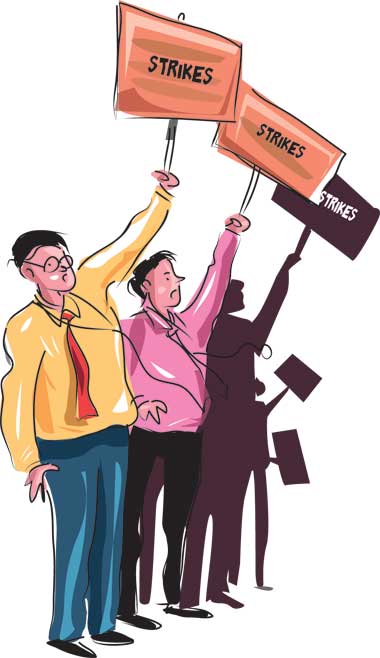Reply To:
Name - Reply Comment
We are being compelled to weigh the merits and demerits of the public sector in the country as well as the occasional outcry by the employees of that sector against privatisation, every time the same employees resort to strikes or demonstrations inconveniencing the general public. The reason has been the haste they display in crippling the workplaces through their work stoppages and disrupting the public transport through their demonstrations even at the drop of a hat. And also the apparent scant regard they pay towards the inconvenience that masses undergo during such trade union actions, is another point worth considering.
One of the best cases in point was the strike action by the locomotive engine drivers of the Railway Department who reportedly protested against the placement of a person in a particular position. This was not an issue that would affect the rights of thousands, or at least hundreds, of workers of the Railway Department nor would it endanger the transport industry. However, the strike resulted in tens of thousands, if not hundreds of thousands of commuters suffering. These were the  commuters who pay from their hard-earned money to sustain the railway service and thereby the lives of the very striking workers and their family members.
commuters who pay from their hard-earned money to sustain the railway service and thereby the lives of the very striking workers and their family members.
One cannot contest the right of the Railway Department employees in particular and the public and private sector employees in general to rise against the injustices, if any, meted out to them by the authorities concerned. Neither could one accept the implicit claim by these trade union actions on the right to hold the general public to ransom by the employees.
It goes without saying that the greater the number of people suffering and the higher the degree of such suffering, the more the pressure being exerted upon the authorities to intervene and to settle the issues in question. On the other hand, it is needless to say that such a situation leads to the infringement of the rights of the people.
Services such as health, education and transport are not privileges offered to the masses by the State or the trade unions, rather they are the rights of the people, universally recognised and accepted as much as the right of the workers to protest through strikes and demonstrations. Hence, the rights of the people and those of the workers are intertwined or overlapping. Unless the trade union leaders understand this the masses someday would inevitably turn against them. It is public knowledge that already the people prefer the private sector banks, hospitals and departmental stores etc. to those of the public sector due to the efficiency, respect to the customers and lesser corruption at the former places.
Interestingly, that is the kind of situation the authorities too prefer and hence they too would pay a scant respect towards the interests of the people during trade union actions in the public sector, in order to pit the workers against the masses, irrespective of the pressure being exerted upon them. In the meantime, the propaganda war between the authorities and the trade unions is also another factor tha would land the people in further trouble during trade union actions. For instance, during the locomotive engine drivers’ strike commuters complained to the media that they were deceived by the statements of the authorities that the majority of the trains were on track, despite the strike.
We do not see much trade union action in the private sector as in the public sector although private sector employees do not enjoy many rights / privileges such as pensions, a large number of holidays, train season tickets for a meager amount, shorter work hours and lesser administrative control that the public sector employees enjoy. Thus, it is not only the authorities of the public sector and the government in general, but also the trade unions are further driving the masses towards the private sector and also to accept the privatisation of public enterprises, through their hasty and high-handed trade union actions.